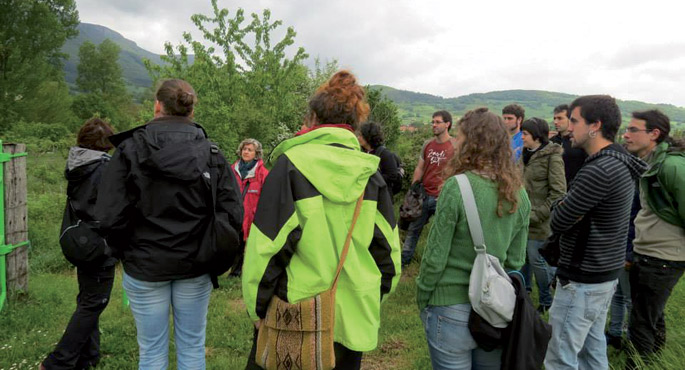
- The Katilu project aims to promote innovation in the primary sector. Having concluded that the joint exploitation of goods is necessary a working attitude, experience in the Auzolan have been identified and collected.

In 2009, agents of the agricultural sector of the CAPV developed a process of reflection called Topaketa. After analysing the situation and sharing forward-looking initiatives, they decided to launch the Katilu project, with the aim of promoting innovation in their sector. In addition to the Basque Government, public, private and common enterprises operate in Katilu. In their conclusions, they emphasized the importance of caring for and cultivating the commons. It is a question of promoting common working attitudes, initiatives in the field of auzolan. In the study on the closest knowledge of the management of the common goods of the primary sector of the Basque Country and the organization of collective organizations, various initiatives have been taken based on three criteria: self-management, self-organization and decision-making capacity of the participants in the project.
The lessons learned have been divided into three blocs. First of all, those intended for the production and marketing of the product. Secondly, the groups working in the conservation and/or renovation of public goods; and, finally, the integral projects that combine the previous two.
Example of Orduña's experience
The integral experience of Orduña, in the opinion of the members of Katilu, has a special interest. In this locality in Biscay, several groups and the City Hall have joined together to promote food sovereignty, local production and foodstuffs. Despite more projects, the report highlights three.
The Bedarbide Livestock Association consists of farmers from Orduña and the region. For the first time they came together to recover the pastures of the Popular Forest of Ponata, and since then they have carried out numerous joint activities. In addition to strengthening ties between them, they have exchanged experiences and researched techniques to improve the effectiveness of work.
Production Orduña is a municipal service created to promote the agroecological development of the locality. They seek to integrate food sovereignty into production processes. In other words, they want to make it known that it is possible to feed on local products as much as possible. Among other things, courses have been organized for farmers and farmers and the fair that was once held every month has been restored. As explained, these initiatives have increased the presence of Orduña's products in local shops. In addition, three essential conditions have been identified in the food production process: caring for nature, protecting the living and working conditions of producers and prioritizing the health of consumers.
For its part, the Orduña Zaporeak group works to ensure that local agricultural products have a place in the market. They argue, “large food corporations and large retail outlets have almost completely absorbed the food market.” To cope with them, they want to strengthen ties between producers and consumers, and to do so they make fairs, visits to homes and factories, etc. The intention is to sell the film mainly in Orduña, but they have also tried to do so in the face of the street door.
Obviously, Orduña’s initiatives have a lot to do with them. The agents have identified the objectives that the people have in common and have worked on them. The Katilu project wants to unite and promote these kinds of experiences.